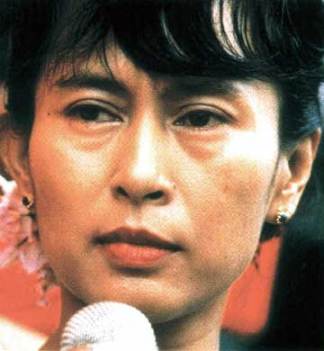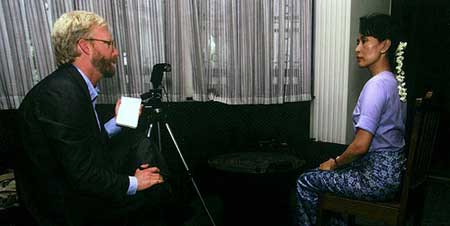Drowning in Love
By Stephen Brookes in Yangon
For Asia Times, December 1996
Starting next week, the World Peace Foundation and Harvard University will host a three-day conference called "The Political and Economic Reconstruction of Burma." The speakers will include over two dozen well-respected scholars and public figures, who the sponsors promise will "contribute to an enlargement of the world's appreciation of the many dynamic forces that have shaped and are shaping Burma's response to its challenging political, social and economic environment."
And, significantly, not a single representative of the Myanmar government will be there. "It's extraordinary," one of the invited speakers -- a well-known democracy activist -- told me over the phone. "Here is a group having what is supposed to be a serious discussion of Myanmar's future, and there won't be anyone presenting the views of the people who, in real terms, matter most: the military government."
"It's extraordinary," one of the invited speakers -- a well-known democracy activist -- told me over the phone. "Here is a group having what is supposed to be a serious discussion of Myanmar's future, and there won't be anyone presenting the views of the people who, in real terms, matter most: the military government."
Not that it really makes any difference. The ruling State Law and Order Restoration Council has as little use for Harvard as Harvard has for the Slorc. And in the time-honored tradition of academic conferences everywhere, the scholars will deliver their papers, politely disagree over details and then all go out for a drink. The actual impact of the conference on Myanmar's "political and economic reconstruction" is likely to be nil.
And that's unfortunate, because it underscores a key reality about the international debate over Myanmar: For all intents and purposes, it's just a game.
Rather than finding serious ways to open channels and bring about actual change in a highly authoritarian regime, the international movement to restore democracy to Myanmar has degenerated into an exercise in boycotts, name-calling and political correctness that is undermining the very goals it aims to achieve.
"It's become impossible to to talk realistically about the situation in Burma, because that means acknowledging that Aung San Suu Kyi's position is increasingly weak and that the Slorc is getting stronger," said the conference participant. "But if you come out and say that, you're shouted down and branded as a Slorc apologist. There's a tremendous sense of intimidation in the academic community."
And the impact has been telling. Ever since Aung San Suu Kyi was released from house arrest in July 1995, she's been canonized as a champion of democracy while pursuing a strategy of increasing irrelevance -- and one has led directly to the other.
The unquestioning admiration she's been bathed in has insulated her from reality and robbed her of hard-headed criticism and pragmatic advice, say many in Yangon.
Moreover, her sense of moral rightness is so strong and her hatred of the military government so intense that her strategic thinking is based on emotion, not analysis -- and has encouraged an equally intense and distorted response from the Slorc.
There are now simply two enemy camps, and the middle ground for dialogue has been squeezed out, to everyone's loss.
"Her real problem is that the world drowned her in love," a diplomat in Yangon told me last week. "The Nobel Peace Prize, the adulation of the press, and especially the uncritical support she got from Washington -- it all convinced her that she was an invincible moral force."
Unfortunately, this triumph of idealism over pragmatism has weakened Suu Kyi's position, while the Slorc is stronger in every way -- militarily, economically and diplomatically -- than it was in 1988. It has no need to talk with her, and from all appearances is increasingly hostile toward her. And now, with entry into ASEAN next year looking increasingly likely, the gap is likely to widen even further.
But has this served as a wake-up call?
I asked Suu Kyi recently whether, since the Slorc was probably going to hold onto power for a long time, it might make sense to work with the government in order to get economic help to the people of Myanmar. From the verbatim transcript:
"I don't see why we have to work with a system just because it's there," she said.
"Well, it's reality ..." I answered.
"No, it is not," she said.
"It isn't?" I asked.
"Of course not," she answered.
"The government is not real?" I asked again, not sure I was hearing her correctly.
"Governments change all over the world, all the time," she answered. "I mean, this is unheard of, to stay with one system, I've never heard of such a thing. Systems change all the time. Besides, we are Buddhists, we believe in impermanence ... there is change all the time. What is here today, gone tomorrow. We are a Buddhist country, we cannot accept the eternal concept." 
Stephen Brookes with Aung San Suu KyiExperienced Myanmar-watchers are used to these kinds of platitudes from Suu Kyi, and they play well with Western college students, US Congressmen and institutes of world peace.
But on the ground in Yangon, she's viewed with a more skeptical eye. At a dinner party recently in the upscale Golden Valley neighborhood, not far from Suu Kyi's villa, a visiting merchant banker -- an American citizen, but Indian by birth -- mused on the careers of Suu Kyi and Indira Gandhi, both daughters of men who had led their countries.
"Indira surprised everyone," said the banker. "No one thought she would amount to much, so they tucked her away in an unimportant spot in the government and ignored her. But she turned out to be a much more clever and ruthless politician than they suspected, and she built up her power step by step, smashing her enemies as she rose. And eventually she climbed all the way up.
"But Suu Kyi," he continued, "is an amateur. She insists on starting at the top, so she's still stuck at the bottom. She's too full of moral virtue to be a successful politician. Which is why she'll probably never be in power in Myanmar."
References (2)
-
 Response: writing services company reviewsThat was a very good interview with suu yi, and it really inspires many women across the world when they go through this interview. I jus take her as inspiration.
Response: writing services company reviewsThat was a very good interview with suu yi, and it really inspires many women across the world when they go through this interview. I jus take her as inspiration. -
 Response: things to do near me
Response: things to do near me


Reader Comments